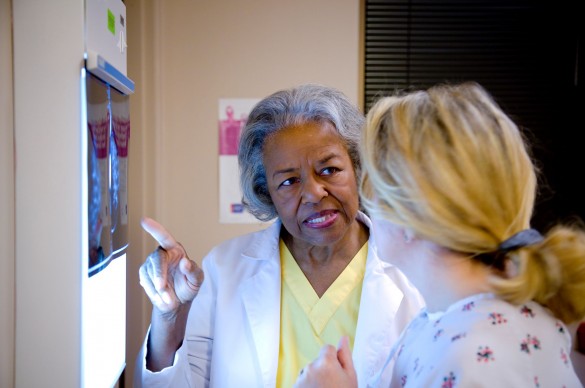March is National Nutrition Month, and I thought it would be a good opportunity to share some of ACS CAN's efforts to reduce overweight and obesity, which are proven to cause cancer. By now it is well known that we should eat healthy foods and watch our weight to prevent chronic illnesses such as cancer. In fact, 14% of cancer deaths in men and 20% of cancer deaths in women are associated with excess weight. Obesity is a problem at very young ages, and getting kids off to a healthy start is important for reducing future cancer risk. But what specifically can we do to reduce overweight and obesity in ourselves and our families? The American Cancer Society in January released updated Guidelines on Nutrition and Physical Activity for Cancer Prevention, which make evidence-based recommendations on what you can do to reduce your risk. Some of the nutrition guidelines include:
- Choose foods and beverages in amounts that help achieve and maintain a healthy weight
- Limit consumption of processed meat and red meat
- Eat at least 2.5 cups of vegetables and fruits each day
- Choose whole grains instead of refined grain products
- Limit consumption of alcoholic beverages to no more than 1 drink per day for women and 2 drinks per day for men
While most people want to live healthier lives, often they face barriers that make it more difficult for them to make healthy choices. Therefore, the guidelines also contain a very important line for advocacy: Public, private, and community organizations should work collaboratively at national, state, and local levels to implement policy and environmental changes that increase access to affordable, healthy foods in communities, worksites, and schools, and decrease access to and marketing of foods and beverages of low nutritional value, particularly to youth. This is exactly what we are working toward at ACS CAN. You might remember that new nutrition standards were set by the USDA for school breakfasts and lunches back in January. ACS CAN was supportive of these strong guidelines required under the Healthy, Hungry-Free Kids Act of 2010, which include imposing calorie limits on meals and requiring a larger amount and variety of fruits and vegetables, and considers them a positive step forward toward tackling the nationwide childhood obesity problem. Under the same law, a new rule is expected this spring on competitive foods sold in schools. Competitive foods include anything sold in vending machines, a la carte lines or school stores. Once the final rule takes effect, it will be the first time there are national standards for all foods and beverages sold in U.S. schools during the school day.
The regulatory process for competitive foods provides another opportunity for ACS CAN to work to improve the nutritional quality of the foods that kids eat in schools daily and complement the strong nutrition standards that have already been set for school meals. I look forward to sharing our comments on the USDA's proposed rule, as well as the final rule once they are released. In addition to work on implementing the Healthy, Hungry-Free Kids Act, ACS CAN is working on the following:
- Strong voluntary nutrition standards for foods and beverages marketed to kids. Proposed voluntary nutrition standards were developed by four government agencies last year, and we continue to advocate for the release of strong final standards and for the industry to voluntarily limit their marketing on unhealthy foods and beverages to youth.
- Menu labeling and vending machine labeling requirements in the Affordable Care Act. We hope that strong final regulations will be released soon
- Key nutrition and health provisions in this year's reauthorization of the 2008 Farm Bill
While healthy eating is important for good health, balancing calories in with calories out through physical activity is essential for achieving and maintaining a healthy weight and avoiding the health risks of overweight and obesity. ACS CAN recommends requiring quality physical education and increasing physical activity in schools, and increasing the availability of walking and biking lanes, trails and places to play in communities. What is lunch like in your child's school? What are they being offered as snacks in vending machines? How do you think these types of policy and environmental changes could help your child's health? **Photos retrieved from: http://bit.ly/GJjak3, http://wapo.st/GCXJ3h & http://bit.ly/GHS1NK

